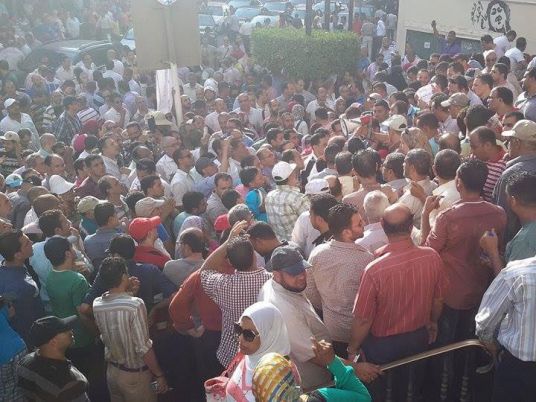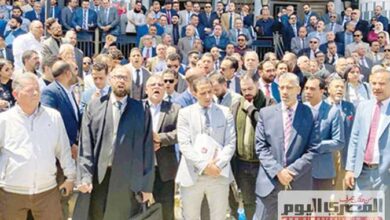
Thousands of employees staged the largest public protest under President Abdel Fattah al-Sisi on Monday against the new civil service law outside the Journalists' Syndicate headquarters, giving the government a one-week deadline to backtrack on the law before they take escalatory measures.
Government officials, meanwhile, responded on Monday by saying they would apply the law.
The protesting employees belong to the Egyptian Tax Authority, as well as the education, archaeology and planning ministries, and the Central Agency for Organization and Management and came from different governorates to take part in the protest.
The protesters called for the cancellation of the law and the dismissal of the finance and planning ministers, as they were the ones who prepared the law and issued statements against protesting employees.
The protesters raised banners that represented their governorates, such as Sohag, Qena, Alexandria, Suez and Port Said. "The civil service law is null", "Oh Finance Minister, the tax employees are not theives," read banners.
They chanted against Finance Minister Hany Qadry Dimian and complained that the law was unconstitutional and against social justice.
"Oh Demian, the tax employees are not Muslim Brotherhood," they chanted, to deny allegations that the protest was staged by the Muslim Brotherhood aiming to spread chaos.
The protesters criticized the performance of media which attacked the Tax Authority employees, especially state media. Some protesters refused to respond to state media workers and pushed them away from the protest area.
Head of the Independent Tax Workers Union Fatma Fouad said the law would harm six million employees, especially the Tax Authority workers.
The protesters are not against the government, but against the law which would freeze the employees' salary during a time when price hikes are increasing more than 30 percent and the inflation rate is at 11 percent, said union member Walid al-Fikki.
Adel Abdel Hamid, a legislation expert with the Central Agency for Organization and Management, said the civil service law is unconstitutional as it excluded a large number of officials and state institutions like the presidency, the Cabinet and sovereign ministries.
A member of the National Council for Human Rights and the head of the Center of Trade Union Services (CTUWS) Kamal Abbas criticized the issuance of the civil service law ahead of the parliamentary elections and without first having a social dialogue.
The laborers' opinion has not been taken into consideration, according to Abbas.
He added that the law would be specifically unjust to Tax Authority workers. The law has cancelled the social bonus, which was equal to 10 percent.
Abbas called on President Abdel Fattah al-Sisi to solve the crisis by issuing a law for maximum and minimum wage rates.
Finance Minister Dimian and Planning Minister Ashraf al-Araby held a press conference Monday afternoon where Araby stated that the Cabinet insists on achieving administrative reform. He denied that the Cabinet would backtrack on or amend the civil service law.
The law allows for gradual legal measures against public employees whose assessment is reported as "weak" for two consecutive years, according to Araby. If the employee's assessment continues to be weak for five consecutive years, they could be dismissed, the minister pointed out.
Ashraf stressed that the new civil service law will be issued to deal with lazy workers.
The law, enacted in March, regulates appointment criteria, vocational degrees, payments, retirements and promotions for civil workers at government agencies. It has drawn criticism from labor rights activists and a number of trade unions that vowed to lobby against the document. The government, meanwhile, says the law would allow for remarkable improvement to the state’s administrative bodies.
Edited translation from Al-Masry Al-Youm




